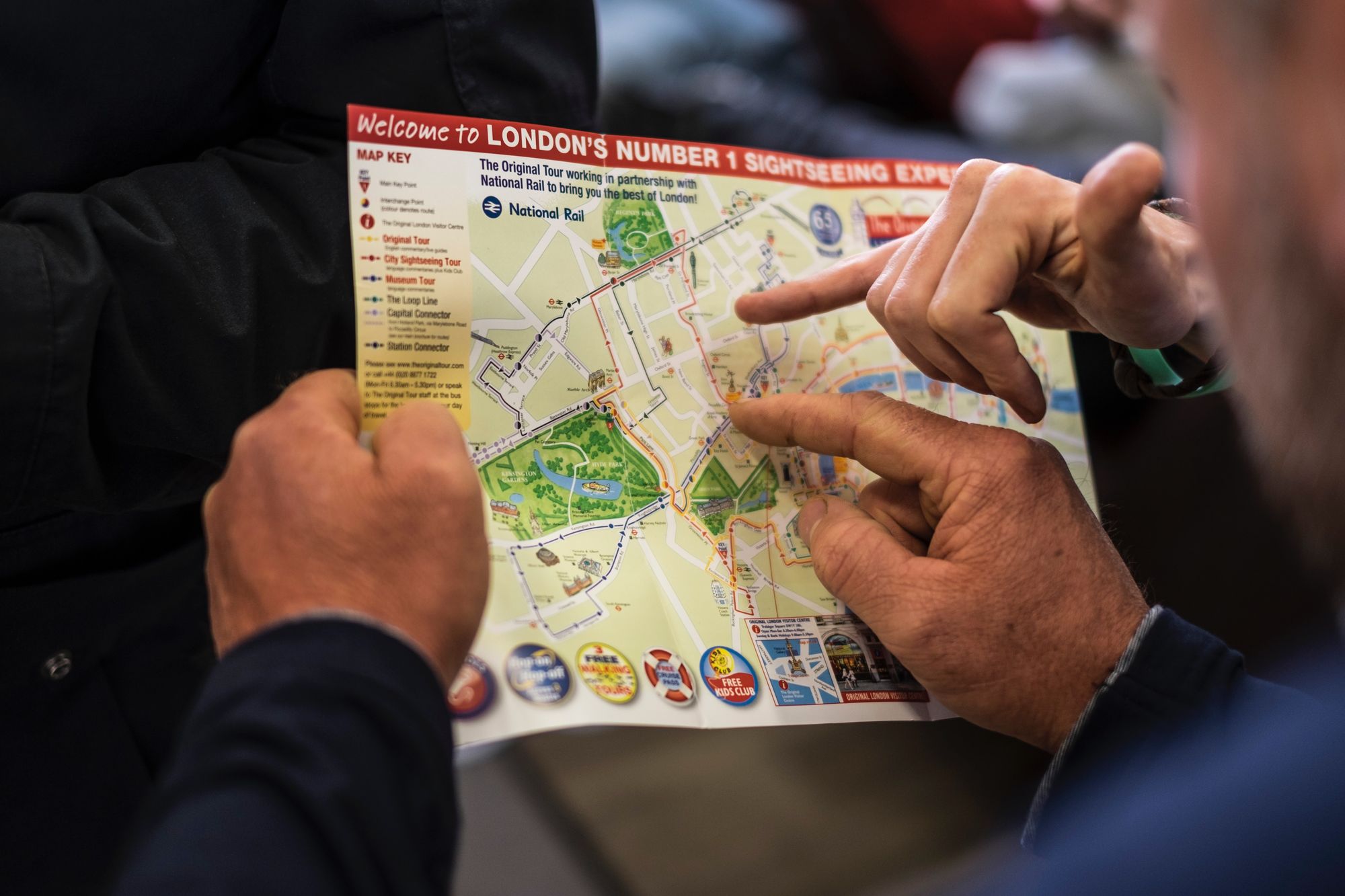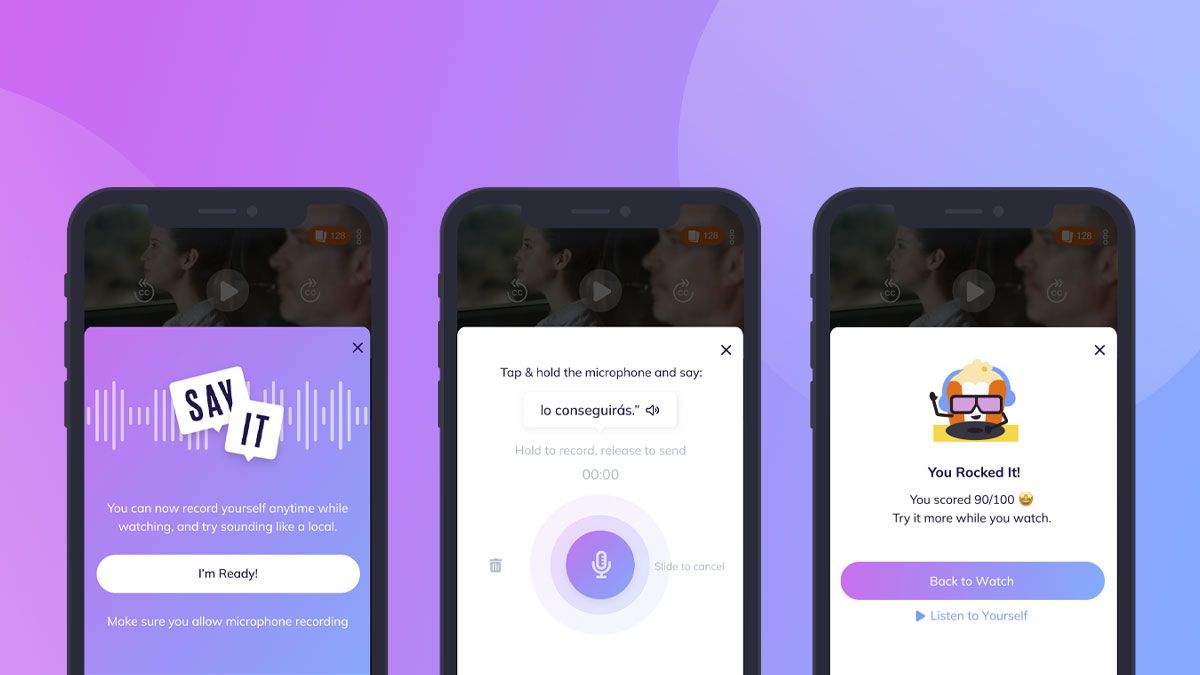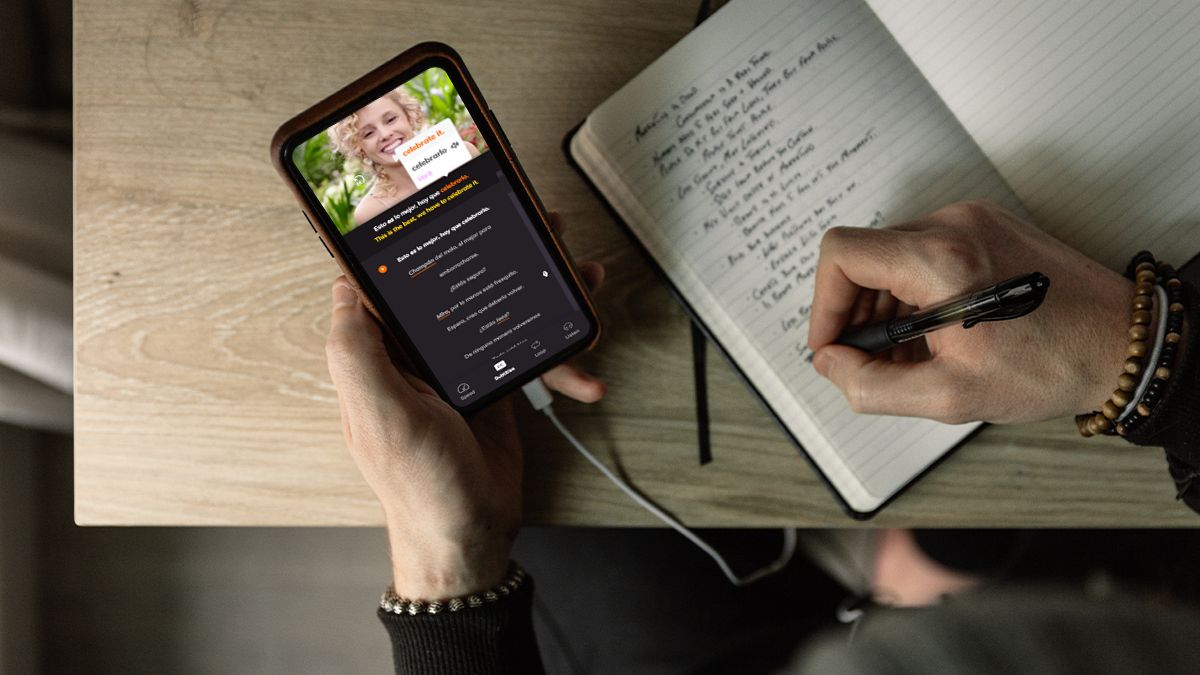If you are interested in learning English quickly and efficiently while having fun, this guide is just for you. We will examine how easy it can be, what the challenges are, how fast you can learn, and where to begin.
Then, we will discuss our 9 top tips for learning English fast. These tips incorporate elements of traditional classroom learning with more immersive, engaging, and fun language acquisition methods. Let's begin!
- 10 Best British TV Shows To Learn English
- 19 Hilarious British Slang Terms to Spice Up Your Vocabulary
- 50+ Shocking British Insults You Need To Know

Is It Easy To Learn English?
English is one of the easiest languages in the world to learn. This is partly due to the huge volume of content available in English, such as great movies, TV shows and music. Moreover, English is an unofficial universal language in many parts of the world.
There are also many cognates with other Germanic and Latin languages. For example, the German word for "baby" is baby, while the Spanish is bebé. If you speak and read a language that uses the Latin alphabet, you’ll learn English much more easily than those who do not.
| English | German | Dutch | Swedish | French | Spanish | Italian |
|---|---|---|---|---|---|---|
| house | Haus | huis | hus | maison | casa | casa |
| mother | Mutter | moeder | mor | mère | madre | madre |
| father | Vater | vader | far | père | padre | padre |
| bread | Brot | brood | bröd | pain | pan | pane |
| water | Wasser | water | vatten | eau | agua | acqua |
| book | Buch | boek | bok | livre | libro | libro |
| dog | Hund | hond | hund | chien | perro | cane |
| friend | Freund | vriend | vän | ami | amigo | amico |
| night | Nacht | nacht | natt | nuit | noche | notte |
Moreover, English doesn’t have gender or word agreement. Only people and animals have a sex classification (man/woman, waiter/waitress, bull/cow, etc.), but the adjective you use to describe any of these nouns would have the same form.
If you speak German, Russian or any other language with a case system, you will be pleased to know that English does not have cases. Beyond knowing when to add a possessive apostrophe to a noun, you don’t have to conjugate or make nouns agree.
Finally, regular verb conjugation in the present tense could not be much simpler. For the third person singular, "he", "she" and "it", you add an "s". That's it!

The Challenges of Learning English
This all sounds great so far, right? However, there are, of course, some challenges for English learners to overcome.
English spelling and pronunciation can be anomalous and confusing at times. The spelling and pronunciation rules are inconsistent due to the language's different roots and borrowed words from various other languages.
When you are learning English, you will come across several words spelled similarly and pronounced very differently. Unfortunately, these just need to be learned through exposure.
An example of such a set of words is:
- Trough
- Bough
- Through
- Though
- Tough
The ough in each word has a different pronunciation.
In "trough", it is pronounced like "off", while in "bough", it is pronounced "ow". In "through", the ough is said like "oo", in "though" it is "oh", and in "tough", it is pronounced like "uff".
As the spelling of these words is no more instinctive than the pronunciation, you could learn them through listening and speaking English but not recognize them as familiar words when you see them written down.
How Quickly Can You Learn English?
For English speakers learning other languages, the FSI has established clear timelines based on language difficulty, ranging from 600-750 hours for easier languages to 2,200 hours for the most challenging ones. When reversed for non-English speakers learning English, the same principles apply.
For most learners, achieving conversational English typically takes 575-600 hours of dedicated study, while reaching professional working proficiency requires 900-1,100 hours. This translates to approximately 24 weeks of intensive study for basic fluency.
However, please note that your progress depends on several practical factors: your native language (speakers of Germanic or Romance languages learn faster), your learning environment (immersion accelerates progress), and most importantly, your consistency

How To Begin Learning the English Language
Getting started on your language-learning journey can be the hardest part. There are two broad approaches to learning a language.
The immersion method involves immersing yourself in the vernacular as much as possible. You can do this by visiting an English-speaking country, watching English TV, listening to English music, and speaking to natives in a language exchange.
The classroom method, by contrast, is less about natural exposure and more about methodically studying the rules of English. Language apps, textbooks, flashcards, online courses, and in-person English classes support this method.
Now, let's explore these methods in more detail by looking at how you can speed up your English language acquisition.
Visit an English-speaking country
One of the best ways to develop your English language skills is to surround yourself with English speakers and try to distance yourself from your own language. This is easiest to achieve when you visit the UK, the US, or any other country in which English is the first language.
There are many ways to learn a language while traveling, such as socializing with native speakers, ordering food in restaurants, getting a job, or volunteering overseas and studying abroad.
When you speak English with natives, you begin to incorporate the study of body language and mannerisms into your speaking practice. You can learn the nuances of the vernacular in this way better than studying from a book or an online class.
When choosing which English-speaking countries to visit, consider whether you want to learn British English or American English. There isn't a huge difference between these variations, and regardless of where you learn, you will be understood anywhere. However, some words and sayings will be unique to the country you visit.

Engage with English Content
This is another classic technique in the immersion method of language learning. By engaging with English radio, podcasts, music, TV, and movies you can naturally absorb new words and grammar.
This is a fun, engaging, and authentic way to develop your English knowledge, as well as build your cultural awareness. You can also follow English-speaking social media accounts or watch videos on YouTube featuring native English speakers. This will expose you to slang and colloquialisms and keep you up to date with internet trends in English-speaking circles.
Take Part in Language Exchanges
Speaking English with a native speaker is one of the best ways to absorb a new language. You can use a language exchange app or attend in-person exchange events to get this vital speaking practice.
Generally, you’ll find an exchange partner whose native language is English. They will want to learn your first language, and you will want to practice English, so you'll take the time to practice speaking in both languages. This way, the experience is mutually beneficial.
Join the vast online community of language learners, find an exchange partner anywhere and start speaking conversational English today!
Use Language Learning Apps
Language apps are an excellent resource for learning a second language when used in conjunction with these other learning methods. The most famous language learning app is Duolingo, but there are many great apps to choose from.
Apps use interactive features like quizzes, games, and competitions to keep you engaged in your learning. Often, making mistakes results in losing points, while learning a new word can earn you an award.

Use Traditional Classroom Materials
As well as immersing yourself in the language, culture, and entertainment produced by English-speaking countries, you can supplement this learning with the traditional classroom method.
There is a place for English textbooks in your learning journey. Sometimes, the discipline and clear instructions provided by textbooks can be invaluable. Moreover, you can create your own flashcards and vocabulary lists with the new words or phrases you learn as you work through your books.
Although learning grammar naturally from TV and movies is a valid and effective method, there will be some grammar points that you need to specifically study from a book. When the rules are not obvious, you can learn grammar the old-fashioned way with worksheets.
Beginners can benefit from the dual method of using classroom materials and building immersive elements into studies. The dual method provides a solid base of grammar and vocabulary from which learners can build as they immerse themselves in the language.

Attend Language Courses and Classes
Language courses and classes offer structure and discipline in the learning process. You will be provided with tried and tested materials, exercises, and assignments specifically designed to impart new language skills.
Moreover, you can practice speaking English with fellow students, share resources, and make friends for life. Even your language teacher can become a huge part of your experience and make all the difference to your learning journey.
An online English course is a great option if you do not have the time or resources to travel to an in-person English class. Even on a video call, you can speak English with peers, develop your English language skills and meet fellow language learners with whom you can share experiences.
An in-person classroom setting is also an excellent option if you have access to this resource. In a classroom, you can get comfortable with making mistakes and work on your English skills with other learners in a safe environment.
Read in English
Improve your reading skills and study English sentence structure with books, magazines, and newspapers, or change the language on your phone to English for near-constant exposure.
Content written by a native English speaker will demonstrate authentic, honest, and sometimes poetic use of the language.
Try to learn a new word a day by doing at least ten minutes of reading in English. If you read before bed, your brain has a better chance of retaining the information.
Note Down Useful Words and Phrases
As you engage with English content and speak with natives, you will come across lots of new English words. Every time you encounter useful new vocabulary, you should note it down and try to use it regularly until it sticks in your mind.
When you hear a native speaker use a slang expression or idiomatic phrase, it is a good idea to note down the saying as well as the context in which it was used so you remember how to use it properly.
Keep an English Diary
This is an activity that is often recommended in English classes and used as a homework task. Keeping a diary is great for your writing skills and retention of new words.
Try to incorporate certain words that you have learned in the week in your writings, so you have examples of their usage in context.
Looking back over your diary is also a wonderful way to see how far you have come in your learning journey.

Learning English at Home: Efficient and Accessible Learning
Above, we have provided a list of 9 of the best methods for learning English quickly and efficiently. However, some of these methods, such as traveling to an English-speaking country or taking classes, can be very expensive and inaccessible to learners.
So, let's look at options for learning a new language at home, for free, or on a budget. These include listening to music, watching TV and movies, and delving into English literature.
These options are valid and effective approaches to language learning, and they are lots of fun!
English Music Recommendations
When choosing which English songs to listen to, consider the accents, slang and dialects featured. Examples of easy listening include any of the classic songs by The Beatles, Bob Dylan, or ABBA.
If you are up for the challenge, check out faster-paced songs, or singers with distinctive accents, such as Stormzy or Nicki Minaj. Sing along to practice your fluency and note any fun new vocabulary.
You can also listen to podcasts by native English speakers if you are studying at an intermediate or advanced level. If you love celebrity interviews, check out Armchair Expert, hosted by American actors Dax Shepard and Monica Padman.
English TV and Movie Recommendations
Watch English movies and TV shows to develop your authentic use of English and work on your comprehension. Classic movies to watch for language acquisition and cultural awareness include Forrest Gump, Notting Hill, and Braveheart.
You can learn a language by watching TV as you absorb key vocabulary and sayings important to everyday life. Check out sitcoms like Friends, The Office, and New Girl to learn practical English words in context and have fun while doing it!
English Literature Recommendations
English learners can benefit hugely from engaging with English literature. From world-renowned novels and poetry to simple children's books or magazines, there is no right or wrong way to dive into the rich world of English literature.
Check out Charlotte's Web by E. B. White and The Hobbit by J. R. R. Tolkien for some classic children's stories in English. Or try Animal Farm by George Orwell and Of Mice and Men by John Steinbeck if you would like to explore some English literary giants.
You can also listen to audiobooks to work on your listening skills. Start with a familiar story, such as the Harry Potter series, read by Stephen fry, if you are a beginner.

The Best Ways to Learn English Quickly
So, there you have it! Using a range of immersive and engaging study methods is the ultimate way to learn English quickly.
We have provided a list of 9 great ways to develop your English language skills, including visiting a country where English is natively spoken, engaging with English content, and taking part in language exchange events.
Learning a language can be fun, social, and culturally enriching when you incorporate literature, music, TV, and movies into the process.
If you like the sound of learning languages by binge-watching TV and movies, check out Lingopie. This streaming service is home to great content in 8 popular languages and offers a blog and community where language learners can share ideas.
FAQs: The Best Ways to Learn English Fast
Does my native language affect how quickly I will learn English?
Yes, depending on your mother tongue, you will find learning English easier or more challenging. If you already know the alphabet and are familiar with many cognates, you will have a natural advantage over those who do not.
What are the best ways to build your English vocabulary?
Immersion in English is the best way to develop your vocabulary. This is a more natural and engaging approach than studying vocabulary lists for hours on end. Listen to music, watch movies, speak to natives, read and travel when you can.
Is English grammar logical?
English grammar rules are largely consistent and logical. As you have seen, the spelling and pronunciation can be anomalous, but the grammar itself is fairly straightforward when you have learned the rules.
The problem is that many native speakers do not actually know the grammar rules in English and use their native language incorrectly. For instance, splitting infinitives and misusing past participles are common native mistakes.
Are English classes the best way to learn English fast?
English classes are very valuable and structured resources for learning. They are certainly beneficial and, when used in conjunction with other methods, can significantly increase your fluency and confidence.








![20+ Gen Alpha Slang And What They Mean [Guide]](/blog/content/images/size/w300/2025/06/Gen-Alpha-Slang.jpg)
